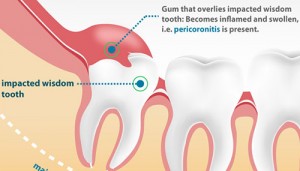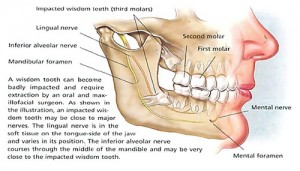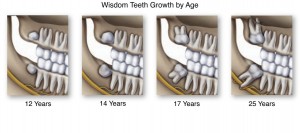What are wisdom teeth?
Wisdom teeth are the last of the large grinding teeth (molars) to erupt and usually do so between the ages of 17 and 24, though they can do so earlier or later. There can be up to four present – one in each back corner of your mouth. For most people, wisdom teeth do not cause any problems and may never need to be removed. However, if there is insufficient space for them to erupt then they can get stuck (impacted) against the jawbone behind or the molar tooth in front. This increases the risk of problems.
When should wisdom teeth be removed?
The commonest reason for removal is recurrent pain and swelling associated with a partly erupted tooth. This condition is termed Pericoronitis. This and other indications are listed below:
Pericoronitis
Dental caries (tooth decay)
Periodontal disease (gum disease)
Fracture of the tooth
Cyst formation


How are wisdom teeth removed?
The procedure for removing your wisdom teeth will depend on how complicated they are, your general health and your previous experience of dental treatment. Some wisdom teeth can be extracted like any other tooth using dental forceps under local anaesthetic. However, if your tooth is more difficult than this then your surgeon will need to make a small cut into your gum, lifting it up to uncover the whole crown of the tooth. The tooth my then be split into smaller pieces and a small amount of bone removed from around the tooth using a small surgical drill. This feels much like having a large filling done. The tooth and roots are then pushed (elevated) out using small instruments called dental elevators rather than conventional forceps. This is not painful, even under local anaesthetic, though you will be aware of some noise and vibration from the drill and a sensation of heavy pushing. The area is washed with sterile saline and closed using two or three dissolvable stitches. Most wisdom teeth only take a few minutes to remove, but the more difficult ones can take up to 30 or 40 minutes.
What happens after surgery?
Your consultant will give you advice about looking after your mouth when you go home and suitable pain medication and appropriate antibiotics or mouthwashes to take home. You may also be given a date for a follow-up appointment.
Dissolvable stitches will disappear on their own in seven to 10 days. Non-dissolvable stitches are removed around a week after surgery.

